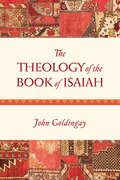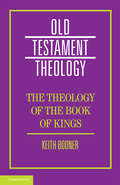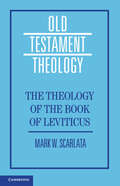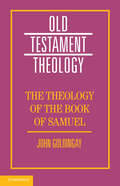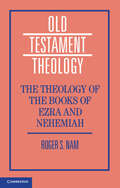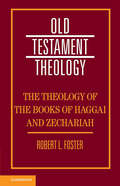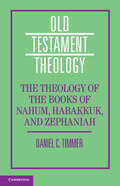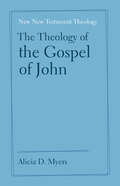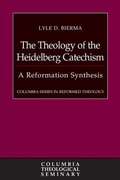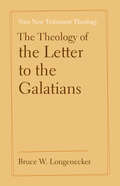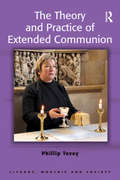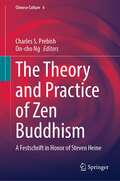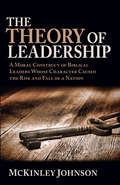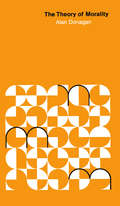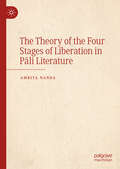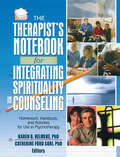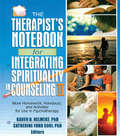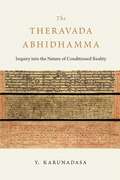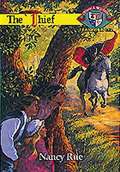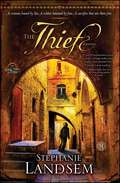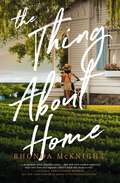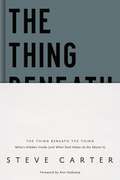- Table View
- List View
The Theology of the Book of Amos
by John BartonIn modern times Amos has come to be considered one of the most important prophets, mainly for his uncompromising message about social justice. This book provides a detailed exploration of this theme and other important elements of the theology underlying the book of Amos. It also includes chapters on the text itself, providing a critical assessment of how the book came to be, the original message of Amos and his circle, which parts of the book may have been added by later scribes, and the finished form of the book. The author also considers the book's reception in ancient and modern times by interpreters as varied as rabbis, the Church Fathers, the Reformers, and liberation theologians. Throughout, the focus is on how to read the book of Amos holistically to understand the organic development of the prophet's message through the many stages of the book's development and interpretation.
The Theology of the Book of Isaiah: Diversity And Unity
by John GoldingayWhat should we make of the sprawling and puzzling book of Isaiah—so layered and complex in its composition? John Goldingay helps us see, hear and understand the grandeur of this prophetic masterpiece among the Prophets as both separate parts and as a whole, clearly tied together with unifying themes.
The Theology of the Book of Kings (Old Testament Theology)
by Keith Bodner1 and 2 Kings unfolds an epic narrative that concludes the long story of Israel's experience with institutional monarchy, a sequence of events that begins with the accession of Solomon and the establishment of the Jerusalem temple, moves through the partition into north and south, and leads inexorably toward the nation's destruction and the passage to exile in Babylon. Keith Bodner's The Theology of the Book of Kings provides a reading of the narrative attentive to its literary sophistication and theological subtleties, as the cast of characters - from the royal courts to the rural fields - are variously challenged to resist the tempting pathway of political and spiritual accommodations and instead maintain allegiance to their covenant with God. In dialogue with a range of contemporary interpreters, this study is a preliminary exploration of some theological questions that arise from the Kings narrative, while inviting contemporary communities of faith into deeper engagement with this enduring account of divine reliability amidst human scheming and rapaciousness.
The Theology of the Book of Leviticus (Old Testament Theology)
by Mark W. ScarlataLeviticus is often considered to be one of the most challenging books of the Bible because of its focus on blood sacrifice, infectious diseases, and complicated dietary restrictions. Moreover, scholarly approaches have focused primarily on divisions in the text without considering its overarching theological message. In this volume, Mark W. Scarlata analyses Leviticus' theology, establishing the connection between God's divine presence and Israel's life. Exploring the symbols and rituals of ancient Israel, he traces how Leviticus develops a theology of holiness in space and time, one that weaves together the homes of the Israelites with the home of God. Seen through this theological lens, Leviticus' text demonstrates how to live in the fullness of God's holy presence and in harmony with one another and the land. Its theological vision also offers insights into how we might live today in a re-sacralized world that cherishes human dignity and cares for creation.
The Theology of the Book of Revelation
by Richard BauckhamRichard Bauckham expounds the theology of the Book of Revelation: its understanding of God, Christ and the Spirit, the role of the Church in the world, and the hope of the coming of God's universal kingdom. Close attention is paid both to the literary form in which the theology is expressed and to the original context to which the book was addressed. Contrary to many misunderstandings of Revelation, it is shown to be one of the masterpieces of early Christian literature, with much to say to the Church today. This study offers a unique account of the theology and message of Revelation.
The Theology of the Book of Samuel (Old Testament Theology)
by John GoldingayThe Old Testament book of Samuel is an intriguing narrative that offers an account of the origin of the monarchy in Israel. It also deals at length with the fascinating stories of Saul and David. In this volume, John Goldingay works through the book, exploring the main theological ideas as they emerge in the narratives about Samuel, Saul, and David, as well as in the stories of characters such as Hannah, Michal, Bathsheba, and Tamar. Goldingay brings out the key ideas about God and God's involvement in the lives of people, and their involvement with him through prayer and worship. He also delves into the mystery and complexity of human persons and their roles in events. Goldingay's study traces how God pursues his purpose for Israel and, ultimately, for the world in these narratives. It shows how this pursuit is interwoven with the realities of family, monarchy, war, love, ambition, loss, failure, and politics.
The Theology of the Books of Ezra and Nehemiah (Old Testament Theology)
by Roger S. NamIn the opening verses of the Book of Ezra-Nehemiah, King Cyrus exhorts the exiled Judeans to return to Jerusalem to restore worship in Jerusalem. It then narrates this restoration through the construction of the temple, the repair of the city walls, and the commitment to the written Torah. In this volume, Roger Nam offers a new and compelling argument regarding the theology of Ezra-Nehemiah: that the Judeans' return migration, which extended over several generations, had a totalizing effect on the people. Repatriation was not a single event, but rather a multi-generational process that oscillated between assimilation and preservation of culture. Consequently, Ezra-Nehemiah presents a unique theological perspective. Nam explores the book's prominent theological themes, including trauma, power, identity, community, worship, divine presence, justice, hope, and others – all of which take on a nuanced expression in diaspora. He also shows how and why Ezra-Nehemiah naturally found a rich reception among emerging early Christian and Jewish interpretive communities.
The Theology of the Books of Haggai and Zechariah (Old Testament Theology)
by Robert FosterTucked away at the end of the Minor Prophets, the Books of Haggai and Zechariah offer messages of challenge and hope to residents of the small district of Yehud in the Persian Empire in the generations after the return from Babylonian exile. In this volume, Robert Foster focuses on the distinct theological message of each book. The Book of Haggai uses Israel's foundational event - God's salvation of Israel from Egypt - to exhort the people to finish building the Second Temple. The Book of Zechariah argues that the hopes the people had in the prophet Zechariah's days did not come true because the people failed to keep God's long-standing demand for justice, though hope still lies in the future because of God's character. Each chapter in this book closes with a substantive reflection of the ethics of the major sections of the Books of Haggai and Zechariah and their implications for contemporary readers.
The Theology of the Books of Nahum, Habakkuk, and Zephaniah (Old Testament Theology)
by Daniel C. TimmerThe books of Nahum, Habakkuk, and Zephaniah address problems in and around ancient Judah in ways that are as incisive and critical as they are optimistic and constructive. Daniel C. Timmer's The Theology of the Books of Nahum, Habakkuk, and Zephaniah situates these books in their social and political contexts, examining the unique theology of each as it engages thorny problems in Judah and beyond. In dialogue with recent scholarship, this study focuses on these books' analysis and evaluation of the world as it is, focusing on both human beings and their actions, and God's commitment to purify, restore, and perfect the world. Timmer also surveys these books' later theological use and cultural reception. His study brings their theology into dialogue with concerns as varied as ecology, nationalism, and widespread injustice. It highlights the enduring significance of divine justice and grace for solid hope and effective service in our world.
The Theology of the Gospel of John (New New Testament Theology)
by Alicia D. MyersIn this volume, Alicia Myers applies a narrative approach to the theology of the Gospel of John, which presents Jesus's coming as the climactic and transformative revelation of God in the world. Placing her study in the context of past and current approaches to John's theology, she explores theological themes with an eye toward the rhetorical categories and aims of the Gospel. These themes include: John's use of Scripture in its presentation of God, Jesus's characterization as the unique one who reveals God's will, the presentation of the world in need of rescue through purification and exorcism, and the ongoing work of the Holy Spirit among the community of believers. Myers argues that John reframes other Gospel traditions and provided important fodder for early Christians debates. Contemporary readers inherit John's complicated legacy, including its apocalyptic view of liberation that relies on and undermines Jewish perspectives that do not recognize Jesus as God's Son and Christ.
The Theology of the Heidelberg Catechism
by Lyle D. BiermaThe Heidelberg Catechism, first approved in 1563, is a confessional document of the Protestant movement considered one of the most ecumenical of the confessions. Published to coincide with the catechism's 450th anniversary, this book explores the Heidelberg Catechism in its historical setting and emphasizes the catechism's integration of Lutheran and Reformed traditions in all of its major doctrines. An appendix contains a translation of the Heidelberg Catechism recently prepared and adopted by three of the Reformed denominations that recognize the catechism as one of their confessions: the Presbyterian Church (U. S. A. ), the Reformed Church in America, and the Christian Reformed Church in North America.
The Theology of the Letter to the Galatians (New New Testament Theology)
by Bruce LongeneckerIn his letter to the Galatians, Paul sets out an astute vision of what God has done in Christ against the backdrop of a world out-of-joint, a world engulfed in identity-distorting domination systems. Theologically profound and prophetically challenging, Galatians showcases God's initiative to empower liberation from those systems and their relational toxicity. For Paul, the union of Christ with his followers fosters flourishing forms of relational life that testify to the sovereign power of God over all competing forces. In The Theology of Galatians, respected New Testament scholar Bruce Longenecker cuts through the complexity of a notoriously opaque text, disentangling and interpreting Paul's discourse to reveal its multifaceted cosmology, its comprehensive coherence, and its penetrating analysis humanity and the divine. Offering a new interpretation of Galatians, his volume synthesizes the best of four main interpretative alternatives, finding new solutions to scholarly gridlock.
The Theory and Practice of Extended Communion (Liturgy, Worship and Society Series)
by Phillip ToveyThree churches have recently produced liturgies for 'extended communion'. This is the distribution of previously consecrated elements at a public service by lay people or a deacon in the absence of a priest. This development began in the Roman Catholic Church with the Vatican 'Directory on Sunday Worship in the absence of a priest' in 1988. The Methodist Church produced a service of Extended Communion in 1999, and the Church of England authorized 'Public Worship with Communion by Extension' in 2001. In this book Phillip Tovey examines these churches to discover the reasons for the production of these services and their theological rationale. An in-depth examination of case studies draws conclusions highly relevant to the wider church.
The Theory and Practice of Zen Buddhism: A Festschrift in Honor of Steven Heine (Chinese Culture #6)
by Charles S. Prebish On-Cho NgThis book brings together an impressive group of scholars to critically engage with a wide-ranging and broad perspective on the historical and contemporary phenomenon of Zen. The structure of the work is organized to reflect the root and branches of Zen, with the root referring to important episodes in Chan/Zen history within the Asian context, and the branches referring to more recent development in the West. In collating what has transpired in the last several decades of Chan/Zen scholarship, the collection recognizes and honors the scholarly accomplishments and influences of Steven Heine, arguably the most important Zen scholar in the past three decades. As it looks back at the intellectual horizons that this towering figure in Zen/Chan studies has pioneered and developed, it seeks to build on the grounds that were broken and subsequently established by Heine, thereby engendering new works within this enormously important religio-cultural scholarly tradition. This curated Festschrift is a tribute, both retrospective and prospective, acknowledging the foundational work that Heine has forged, and generates research that is both complementary and highly original. This academic ritual of assembling a liber amicorum is based on the presumption that sterling scholarship should be honored by conscientious scholarship. In the festive spirit of a Festschrift, this anthology consists of the resounding voices of Heine and his colleagues. It is an indispensable collection for students and scholars interested in Japanese religion and Chinese culture, and for those researching Zen Buddhist history and philosophy.
The Theory of Leadership: A Moral Construct of Biblical Leaders Whose Character Caused the Rise and Fall of a Nation
by McKinley JohnsonCan you imagine hearing a newly elected official taking the following oath of office: &“Do you solemnly swear that if you are not here to help us you at least won't hurt us?&” That may sound far-fetched, but it isn&’t. For the strength of any nation is directly related to the overall well-being of its citizens. In God&’s eyes, how well a nation's leaders treat those who have been marginalized by the larger society has more to do with the country&’s rise or fall than its political, military, or intellectual might. If you are concerned for the plight of humanity, this book is for you. Though written from a leader&’s perspective, its biblical principles and practices are universal. You will see which personal characteristics cause a leader to rise or fall. From that, you will gain valuable leadership tools for yourself by learning how other leaders have been able to garner the favor of God during difficult leadership situations.
The Theory of Morality
by Alan Donagan"Let us . . . nominate this the most important theoretical work on ethical or moral theory since John Rawls's Theory of Justice. If you have philosophical inclinations and want a good workout, this conscientious scrutiny of moral assumptions and expressions will be most rewarding. Donagan explores ways of acting in the Hebrew-Christian context, examines them in the light of natural law and rational theories, and proposes that formal patterns for conduct can emerge. All this is tightly reasoned, the argument is packed, but the language is clear. "—Christian Century "The man value of this book seems to me to be that it shows the force of the Hebrew-Christian moral tradition in the hands of a creative philosopher. Throughout the book, one cannot but feel that a serious philosopher is trying to come to terms with his religious-moral background and to defend it against the prevailing secular utilitarian position which seems to dominate academic philosophy. "—Bernard Gert, Journal of Medicine and Philosophy
The Theory of the Four Stages of Liberation in Pāli Literature
by Amrita NandaThis book investigates the origins and development of the theory of four stages of liberation in Pāli literature. This theory is an important soteriological cartography in early Buddhism, particularly Theravāda Buddhism. Amrita Nanda challenges the traditional interpretation of the four stages by recognizing the impact of the changing socio-religious factors on the theory’s origins and subsequent development. Based primarily on the Pali literary sources, this study utilizes sometimes-overlooked aspects of these texts. This book first traces the origins of each stage individually; then, it traces the formation of the theory and its subsequent development.
The Therapist's Notebook for Integrating Spirituality in Counseling I: Homework, Handouts, and Activities for Use in Psychotherapy
by Catherine Ford Sori Karen B. HelmekeLearn to initiate the integration of your clients’ spirituality as an effective practical intervention. A client’s spiritual and religious beliefs can be an effective springboard for productive therapy. How can a therapist sensitively prepare for the task? The Therapist’s Notebook for Integrating Spirituality in Counseling is the first volume of a comprehensive two-volume resource that provides practical interventions from a wide range of backgrounds and theoretical perspectives. This volume helps prepare clinicians to undertake and initiate the integration of spirituality in therapy with clients and provides easy-to-follow examples. The book provides a helpful starting point to address a broad range of topics and problems. The chapters of The Therapist’s Notebook for Integrating Spirituality in Counseling are grouped into five sections: Therapist Preparation and Professional Development; Assessment of Spirituality; Integrating Spirituality in Couples Therapy; Specific Techniques and/or Topics Used in Integrating Spirituality; and Use of Scripture, Prayer, and Other Spiritual Practices. Designed to be clinician-friendly, each chapter also includes sections on resources where counselors can learn more about the topic or technique used in the chapter—as well as suggested books, articles, chapters, videos, and Web sites to recommend to clients. Each chapter utilizes similar formatting to remain clear and easy-to-follow that includes objectives, rationale for use, instructions, brief vignette, suggestions for follow-up, contraindications, references, professional readings and resources, and bibliotherapy sources for the client. The first volume of The Therapist’s Notebook for Integrating Spirituality in Counseling helps set a solid foundation and provides comprehensive instruction on: ethically incorporating spirituality into the therapeutic setting professional disclosure building a spiritual referral source through local clergy assessment of spirituality the spirituality-focused genogram using spirituality in couples therapy helping couples face career transitions dealing with shame addiction recovery the use of scripture and prayer overcoming trauma in Christian clients and much more! The Therapist’s Notebook for Integrating Spirituality in Counseling is a stimulating, creative resource appropriate for any clinician or counselor, from novices to experienced mental health professionals. This first volume is perfect for pastoral counselors, clergy, social workers, marriage and family therapists, counselors, psychologists, Christian counselors, educators who teach professional issues, ethics, counseling, and multicultural issues, and students.
The Therapist's Notebook for Integrating Spirituality in Counseling II: More Homework, Handouts, and Activities for Use in Psychotherapy
by Catherine Ford Sori Karen B. HelmekeMore activities to tap into the strength of your clients’ spiritual beliefs to achieve therapeutic goals. The Therapist’s Notebook for Integrating Spirituality in Counseling II is the second volume of a comprehensive two-volume resource that provides practical interventions from respected experts from a wide range of backgrounds and theoretical perspectives. This volume includes several practical strategies and techniques to easily incorporate spirituality into psychotherapy. You’ll find in-session activities, homework assignments, and client and therapist handouts that utilize a variety of therapeutic models and techniques and address a broad range of topics and problems. The chapters of The Therapist’s Notebook for Integrating Spirituality in Counseling II are grouped into four sections: Models of Therapy Used in Integrating Spirituality; Integrating Spirituality with Age-Specific Populations: Children, Adolescents, and the Elderly; Integrating Spirituality with Specific Multicultural Populations; and Involving Spirituality when Dealing with Illness, Loss, and Trauma. As in Volume One, each clinician-friendly chapter also includes sections on resources where the counselor can learn more about the topic or technique used in the chapter—as well as suggested books, articles, chapters, videos, and Web sites to recommend to clients. Every chapter follows the same easy-to-follow format: objectives, rationale for use, instructions, brief vignette, suggestions for follow-up, contraindications, references, professional readings and resources, and bibliotherapy sources for the client. The Therapist’s Notebook for Integrating Spirituality in Counseling II adds more useful activities and homework counselors can use in their practice, such as: using religion or spirituality in solution-oriented brief therapy “Cast of Character” counseling using early memories to explore adolescent and adult spirituality cognitive behavioral treatment of obsessive-compulsive disorder age-specific clients such as children or the elderly multicultural populations and spirituality dealing with illness, loss, and trauma recovering from fetal loss creative art techniques with caregivers in group counseling and much more! The Therapist’s Notebook for Integrating Spirituality in Counseling II provides even more creative and helpful homework and activities that are perfect for pastoral counselors, clergy, social workers, marriage and family therapists, counselors, psychologists, Christian counselors, educators who teach professional issues, ethics, counseling, and multicultural issues, and students.
The Theravada Abhidhamma: Inquiry into the Nature of Conditioned Reality
by Y. KarunadasaA lucid explanation of the basic contours of the Theravada Abhidamma system for serious students of Buddhist thought.The renowned Sri Lankan scholar Y. Karunadasa examines Abhidhamma perspectives on the nature of phenomenal existence. He begins with a discussion of dhamma theory, which describes the bare phenomena that form the world of experience. He then explains the Abhidhamma view that only dhammas are real, and that anything other than these basic phenomena are conceptual constructs. This, he argues, is Abhidhamma’s answer to common-sense realism—the mistaken view that the world as it appears to us is ultimately real. Among the other topics discussed are the theory of double truth (ultimate and conceptual truth), the analysis of mind, the theory of cognition, the analysis of matter, the nature of time and space, the theory of momentary being, and conditional relations. The volume concludes with an appendix that examines why the Theravada came to be known as Vibhajjavada, “the doctrine of analysis.” Not limiting himself to abstract analysis, Karunadasa draws out the Abhidhamma’s underlying premises and purposes. The Abhidhamma provides a detailed description of reality in order to identify the sources of suffering and their antidotes—and in doing so, to free oneself.
The Thief
by Nancy RueBook 2 in the Christian Heritage Series, The Williamsburg Years. Thomas suspects Nicholas, the new doctor in town, of stealing horses. But when his friend is seriously injured, Thomas knows the young doctor may be his only chance.
The Thief of Lanwyn Manor: The Governess Of Penwythe Hall, The Thief Of Lanwyn Manor, The Light At Wyndcliff (The Cornwall Novels #2)
by Sarah E. LaddIn Regency England an advantageous match could set up a lady for life. Julia knows Matthew Blake, copper mine owner and very eligible bachelor, is the gentleman she should set her eyes upon. But why can&’t she steal her gaze away from his younger brother, Isaac?Cornwall, England, 1818Julia Twethewey needs a diversion to mend her broken heart, so when her cousin invites her to Lanwyn Manor, Julia eagerly accepts. The manor is located at the heart of Cornwall&’s mining industry, and as a guest Julia is swept into its intricate world. It&’s not long, though, before she realizes something dark lurks within the home&’s ancient halls.As a respected mine owner&’s younger son, Isaac Blake is determined to keep his late father&’s legacy alive through the family business, despite his brother&’s careless attitude. In order to save their livelihood—and that of the people around them—the brothers approach the master of Lanwyn Manor with plans to bolster the floundering local industry. Isaac can&’t deny his attraction to the man&’s charming niece, but his brother has made clear his intentions to court the lovely visitor. And Isaac knows his place.When tragedy strikes, mysteries arise, and valuables go missing, Julia and Isaac find they are pulled together in a swirl of strange circumstances, but despite their best efforts to bow to social expectations, their hearts aren&’t so keen to surrender.Sweet Regency RomanceFull-length novel, approximately 90,000 wordsSecond in the Cornwall series, but can be read alonePraise for The Thief of Lanwyn Manor&“Northanger Abbey meets Poldark against the resplendent and beautifully realized landscape of Cornwall.&” —Rachel McMillan, author of The London Restoration&“Cornwall&’s iconic sea cliffs are on display in The Thief of Lanwyn Manor, but it&’s the lyrical prose, rich historical detail, and layered characters that truly shine. The story anchors the foray into Cornwall&’s copper mining legacy with historical accuracy and brilliant heart. Fans of Regency romance will be instantly drawn in and happily lost within the pages—this is Sarah E. Ladd at her best!&” —Kristy Cambron, bestselling author of the Lost Castle series
The Thief: A Novel (The Living Water Series #2)
by Stephanie LandsemA Roman centurion longing for peace and a Jewish woman hiding a deadly secret witness a miracle that transforms their lives and leads them to the foot of the cross.My God, my God, why have you abandoned me? Nissa is a Jewish woman with a sharp tongue and no hope of marriage. Abandoned by the God she once loved, her only recourse is to depend upon Mouse, the best thief in Jerusalem, to keep her blind brother, Cedron, fed and the landlord satisfied. Longinus is a Roman centurion haunted by death and failure and is desperate to escape the accursed Judean province. Accepting a wager that will get him away from the aggravating Jews and their threats of revolt, he sets out to catch the thieves harassing the marketplace. When a controversial teacher miraculously heals Cedron, Nissa hopes for freedom from her life of lies. But the supposed miracle brings only more misfortune, and Longinus, seeking to learn more about the mysterious healer, finds himself drawn instead to Nissa, whose secret will determine the course of both their futures. Cedron, Longinus, and Nissa are unexpectedly caught up in the arrest, trial, and crucifixion of Jesus. As danger closes in on them from every side, they must decide if the love and redemption Jesus offers is true or just another false promise. How can the so-called Messiah save them from their shackles, when he cannot even save himself?
The Thing About Home
by Rhonda McKnightHome is not a place—it&’s a feeling. Casey Black needs an escape. When her picture-perfect vow renewal ceremony ends in her being left at the altar, the former model turned social media influencer has new fame—the kind she never wanted. An embarrassing viral video has cost her millions of followers, and her seven-year marriage is over. With her personal and business lives in shambles, Casey runs from New York City to South Carolina&’s Lowcountry hoping to find long-lost family. Family who can give her more answers about her past than her controlling mom-slash-manager has ever been willing to share.What Casey doesn&’t expect is a postcard-worthy property on a three-hundred-acre farm, history, culture, and a love of sweet tea. She spends her days caring for the land and her nights cooking much needed Southern comfort foods. She also meets Nigel, the handsome farm manager whose friendship has become everything she&’s never had. And then there are the secrets her mother can no longer hide.Through the pages of her great-grandmother&’s journals, Casey discovers her roots run deeper than the Lowcountry soil. She learns that she has people. A home. A legacy to uphold. And a great new love story—if only she is brave enough to leave her old life behind. &“. . . a beautifully written story about family, self-discovery, secrets, and forgiveness.&” —Kimberla Lawson Roby, New York Times bestselling authorInspiring contemporary fictionStand-alone novelBook length: approximately 100,000 wordsIncludes discussion questions for book clubs
The Thing Beneath the Thing: What's Hidden Inside (and What God Helps Us Do About It)
by Steve CarterThe Thing Beneath the Thing helps readers to identify and then heal from past wounds that have kept them from reaching their full potential and the life of freedom that Jesus has promised every believer.Every driver knows the importance of avoiding potholes when navigating a route. Besides the uncomfortable bump, they can create permanent damage to vehicles. And left untended, potholes can evolve into sinkholes that endanger entire roadway systems. The same is true of our lives. We all have potholes that have been formed by pain, trauma, or choices that we&’ve made. What do we do? Usually we find a quick fix, filling the hole with activities and even addictions disguised as culturally acceptable life choices. But before long, the hole is back, waiting to catch us off-guard, which in the end creates even more permanent damage. In The Thing Beneath the Thing, former Willow Creek Community Church lead teaching pastor Steve Carter asks the simple question, &“How is life working for you?&” He knows that potholes exist and that the longer we live disconnected from answering this question, the more we will fill those holes with harmful choices. The solution? Allow God to fill them with His grace and love so that we can discover the beauty of grace, peace, and wholeness He has for us.The process lies in discovering ourtriggers: the setup that sets us offhideouts: where we go to escape the pain of our storyinsecurities: the false stories we create about ourselvesnarratives: the false stories we create about othersgrace: the place where we discover how to become whole, holy, and spiritually healthyJourney with a seasoned fellow traveler who has learned how to ask key questions that help unlock the places where we&’ve buried things. Then dig deep, invite healing, and learn new ways to operate so that we may begin to experience the life of freedom Jesus has promised us.

